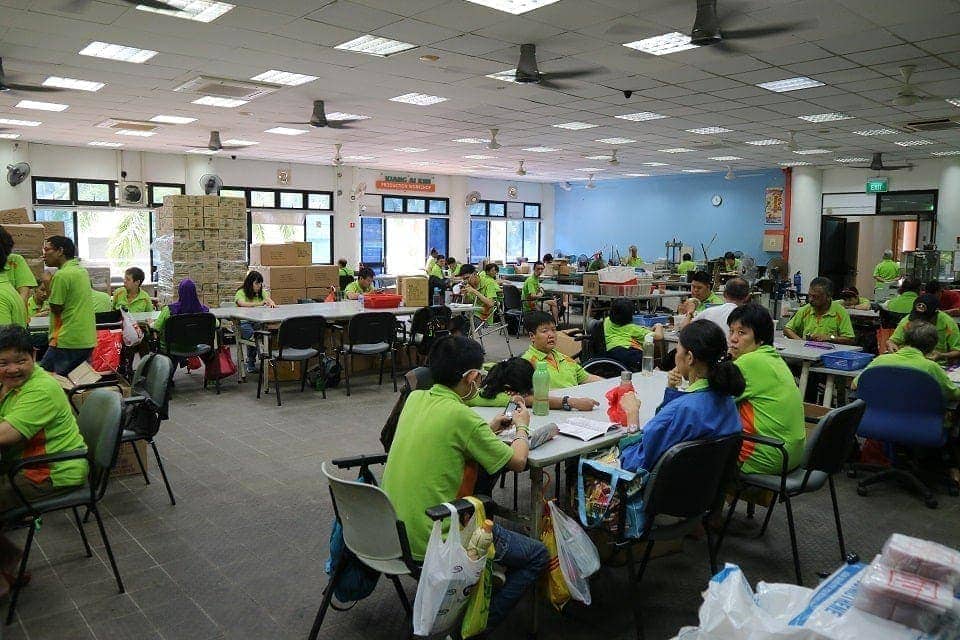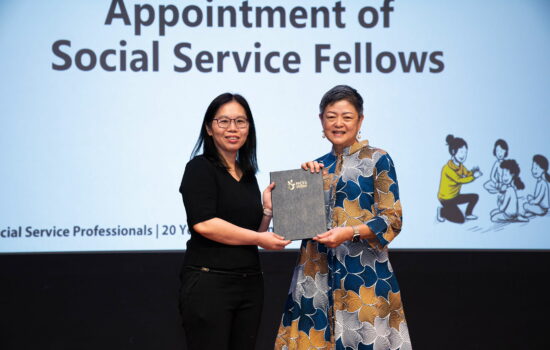The SPD Sheltered Workshop offers vocational training that helps prepare people with disabilities for employment. Located at the second level of the SPD Ability Centre, the workshop brings in small contract work such as packing, data entry and digital archival services to simulate real work environment and develop the trainees’ hard and soft skills. This week in UPDATES, we let you in on what goes on at the workshop and how the trainees play a part in contributing to the society through their involvement there.
The SPD Sheltered Workshop was SPD’s first programme when we started in 1964. Then, we were known as Society for Aid to the Paralysed. The initial objective was to provide employment opportunities for those who had difficulties finding jobs in the open market because of their physical disabilities. The workshop started with carpentry work, such as assembling wooden crates for bottled drinks, and flourished. By 1979, the workshop became self-supporting and profitable.
More than 50 years on, the SPD Sheltered Workshop is still a bustling place that people with disabilities look to for training, supported employment and even camaraderie.

All in a day’s work

A typical day at the workshop starts at 8am and ends at 5pm every weekday.
Under the guidance of six supervisors, more than 100 trainees with disabilities engage in activities ranging from printing, assembling and packing work to digital scanning and archiving of documents.
A group of 10 highly-skilled artisans are responsible for fulfilling the bookbinding and book restoration orders which the workshop undertakes. They also produce quality lifestyle products such as notebooks and photo frames which are made by hand.

There is a work enclave arrangement with an international transport and logistics company located at Sungei Buloh. Here, 13 trainees are involved in packaging work at the customer’s premises. This offers trainees a wider exposure to the challenges of a real-work environment and increases their chances of securing open employment.
Diversity in the workshop

The workshop takes in trainees with diverse disabilities and backgrounds and provides a safe environment for people with disabilities to be involved.
The workshop is made up of people with diverse disabilities and backgrounds and who are at least 18 years old. Primarily, many face mobility challenges resulting from stroke, accidents or congenital conditions such as cerebral palsy. A number of them are hard of hearing or have vision impairments and there are also a handful of them who have multiple disabilities.
Induction
Trainees are generally referred to the workshop by hospitals and community organisations. They are invited to join and are admitted after being assessed to be suitable by our social workers. Before confirmation, new trainees undergo a three-month probation where supervisors will monitor and guide them.
At the start of every project, trainees will be briefed by the workshop supervisors on the demands of the tasks that they are being assigned to. This is an important process as it is important for the trainees to understand what they are working on. The projects and roles assigned to the individuals are by no means random. The trainees are carefully considered and given tasks that they are able to perform, and at the same time, meet their training and development needs.
Tasks are carved out into smaller parts to accommodate the trainees’ wide-ranging abilities. In the instance of a packing project, assembly lines will be formed where some will be responsible for laying out the items while others pack items into bags. This arrangement requires the trainees to work in teams where they learn to leverage one another’s strengths.
The training
The workshop provides a nurturing environment to help trainees develop functional, cognitive and communication skills. They learn to work with others, meet deadlines and understand discipline and routine at a workplace.
“We try to instill workplace discipline as much as we can in our trainees. To be able to listen and take instructions well is important to their development and growth,” said senior workshop supervisor Tan Lee Huan.
Trainees also acquire soft skills and values such as punctuality and appropriate workplace behaviors and communication. As some of the trainees have difficulty with speech, the workshop cultivates a family-like culture such that even without verbal communication, the trainees can still come together and get the job done.
Depending on the level of skills acquired and their productivity, trainees receive a monthly training allowance which helps to supplement their daily expenses, or a salary.
However, it is often the friendships forged with fellow trainees and the supervisors that are the most rewarding part of being in the programme. “They are not at home, cooped up with nowhere to go and nothing to do. At the workshop, they are given responsibilities, get to do meaningful work and in the process, learn new things and make new friends. Some have even advanced to open employment!” said another senior workshop supervisor, R Manoogar. Click here to read a recent interview done with Manoogar.
“I am always learning and doing meaningful work at the workshop,” said trainee Ng May Chan.
“When I see improvements in a trainee, even if they are small, that is when I feel fulfilled. Little things such as seeing the trainee becoming more confident or graduating into open employment, these are all huge victories to us,” said Lee Huan.
For more information on products and services or collaborative opportunities with the SPD Sheltered Workshop, please send us an e-mail or call 6579 0720.





